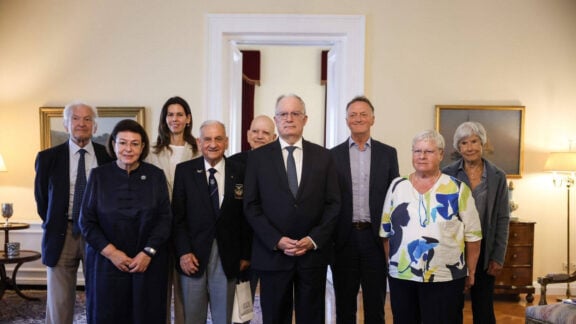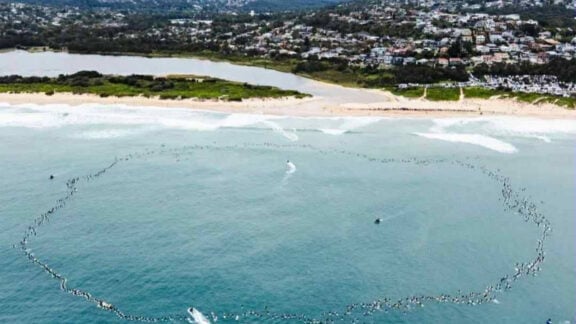Australia and Greece were among the countries that voted in favor of the proposal for an immediate ceasefire in Gaza for humanitarian reasons and the unconditional release of all hostages. The resolution was approved by a overwhelming majority at the UN General Assembly in New York. The U.S. President mentioned that Israel is beginning to lose international community support
A total of 153 countries supported the ceasefire for humanitarian reasons, 10 were against (including Israel and the U.S.), and 23 abstained from the vote.
An amendment proposed by the U.S. to include the condemnation of the “heinous terrorist attacks by Hamas” on October 7 was rejected, The Guardian reported.
Last Friday, the U.S. had vetoed a Security Council resolution calling for an “immediate ceasefire” in Gaza for humanitarian reasons, despite the UN Secretary-General Antonio Guterres urging against the “collective punishment” of Palestinians.
However, the U.S. does not have veto power in the UN General Assembly.
General Assembly resolutions are not binding but carry political weight, reflecting how the international community views the conflict between Israel and Hamas.
The Palestinian ambassador to the UN spoke of a “historic day,” stating that the General Assembly resolution sends a “strong message.”
“It is our duty to continue on this path until we can achieve the end of this attack against our people, the end of this war against our people,” said Riyad Mansour.
On the other hand, the U.S. ambassador to the UN, Linda Thomas-Greenfield, pointed out that there are aspects of the resolution supported by her country, such as the need to address the humanitarian situation in Gaza, protect civilians, and release hostages.
However, she added that “any ceasefire at this moment would be temporary at best and dangerous at worst. Dangerous for Israelis, who would be subjected to relentless attacks, but also dangerous for Palestinians, who deserve the opportunity to build a better future for themselves, free from Hamas.”
“A ceasefire means one thing, ensuring the survival of Hamas, ensuring the survival of terrorists committed to the annihilation of Israel and Jews,” said the Israeli ambassador to the UN, Gilad Erdan.
The Australian ambassador to the UN, James Larsen, stated that the human suffering in Gaza is “heavy and unacceptable.”
He characterised the vote as an evolution of Australia’s position. The country had abstained from a similar vote in late October, citing the “inadequate” language of the proposal for not explicitly naming Hamas as the perpetrator of the October 7 attack. Greece also abstained at that time.
“Australia welcomed the humanitarian pause agreed by the parties in November and brokered by the United States, Egypt and Qatar,” Larsen said.
“This resolution, calling for an immediate humanitarian ceasefire, is the world urging these pauses be resumed, so urgent humanitarian aid can flow. Australia is part of that call and we support this resolution.”
Larsen said Australia saw such pauses as “critical steps on a path to a sustainable and permanent ceasefire”.
He emphasised that Australia sees these ceasefires as “critical steps toward a sustainable and permanent ceasefire.”
This position has been emphatically supported from the beginning by the Greek-Australian federal Labor MP Maria Vamvakinou.
Mr Larsen clarified that Australia supported the amendments proposed by the U.S. (and Austria) “because we believe that this resolution should have gone further, unequivocally condemning Hamas as the perpetrators of the October 7th attack against innocent Israelis.”
SUSTAINABLE CEASEFIRE
Just hours before the UN resolution, Australian Prime Minister Anthony Albanese made a statement in support of a ‘sustainable ceasefire’ in Gaza, along with his counterparts from New Zealand and Canada, Chris Luxon and Justin Trudeau, respectively.
Canada and New Zealand also voted in favour of the proposal presented at the UN General Assembly late on Tuesday (local time).
The three leaders noted their concern “about the shrinking safe space for civilians in Gaza’ and that ‘the price of Hamas’s defeat cannot be for all Palestinian citizens to suffer.”
They expressed support for a repeat of the recent ceasefire and ‘urgent international efforts for a sustainable ceasefire’ (sustainable ceasefire).
Any ceasefire, they stated, “cannot be one-sided.”
“Hamas must release all hostages, stop using Palestinian civilians as human shields, and lay down their weapons.”
They also condemned “the unacceptable treatment of hostages by Hamas” and called for the immediate and unconditional release of all prisoners.
They also condemned the Hamas attack on Israel on October 7 and the “heinous acts of violence that occurred… including sexual violence.”
They recognised Israel’s right to defend itself but stated that civilians and non-military infrastructure “must be protected.”
“In its defense, Israel must respect international humanitarian law,” they said.
They further noted that there is “no role for Hamas in the future governance of Gaza,” while opposing “the violent displacement of Palestinians from Gaza, the recapture of Gaza, any reduction of territory, and any use of siege or exclusion.”
They reiterated their support for the two-state solution and described Israeli settlements in the West Bank and violence as ‘serious obstacles to a negotiated two-state solution.’
Finally, the three prime ministers condemned “the growing anti-Semitism, Islamophobia, and anti-Arab sentiments in our countries and around the world and remain firmly committed to combating prejudice, hatred, and violent extremism.”
Australia’s Foreign Minister, Penny Wong, said that the joint statement had been “discussed for quite some time.”
“It is important that very close allies and like-minded countries speak together to support the position we have articulated.”
Regarding the UN General Assembly resolution, she said it was “a collective statement on the need for an immediate humanitarian ceasefire” with broad support from like-minded partners and was not “a unilateral decision by Australia.”
“Hamas is committed to the destruction of Israel and to hurting the Jewish people,” she said.
Oxfam Australia welcomed the joint statement by Anthony Albanese and the prime ministers of New Zealand and Canada, as well as the outcome of the UN General Assembly resolution, as did the organization Jewish Australians for a Ceasefire.
However, the Israeli Ambassador to Australia, Amir Maimon, criticised Canberra’s change of stance.
In a post on ‘X’ platform, he said he “finds it difficult to understand how Australia can support Israel’s right to defend itself against a terrorist attack while at the same time voting for a ceasefire that will encourage Hamas and allow it to continue its attacks on Israelis.”
ISRAEL IS LOSING SUPPORT…
Meanwhile, U.S. President Joe Biden pointed out that Israel is losing the support of the international community with its “indiscriminate” bombings in Gaza, which have killed thousands of Palestinian civilians. He called on Israeli Prime Minister Benjamin Netanyahu to change the composition of his government.
In contrast to Washington, Biden said in a speech to Democratic Party donors ahead of the U.S. elections that the Israeli government “does not desire the two-state solution” with the Palestinians.
Mr Netanyahu had earlier spoken about “disagreements” he has with the U.S. President regarding the future governance of Gaza after the war ends.
“This is the most conservative government in the history of Israel,” said Biden.
On Monday night, at a reception at the White House for the Jewish festival of Hanukkah, the U.S. President had said that Israelis should be “careful” because “world public opinion can change at any moment.”
He also mentioned his difficult relationship with Mr Netanyahu.
He said that the Israeli Prime Minister has a photo in his office that shows him with Biden when he was a young senator.
As he mentioned, he wrote the following dedication on the photo: “Bibi, I love you a lot, but I don’t agree with anything you say.”
“And that holds true even today,” added Biden, in front of representatives of the Jewish community whom he had invited to the White House.
He also referred to a private conversation in which the Israeli leader told him, “You bombed… Germany, dropped the atomic bomb (in Japan), many civilians died.”
Mr Biden replied, “Yes, that’s why all these institutions were created (such as the UN) after World War II to ensure that it doesn’t happen again… so that we don’t make the same mistakes we made on September 11. There’s no reason we had to be at war in Afghanistan.”
*With AAP, AMNA, The Guardian









